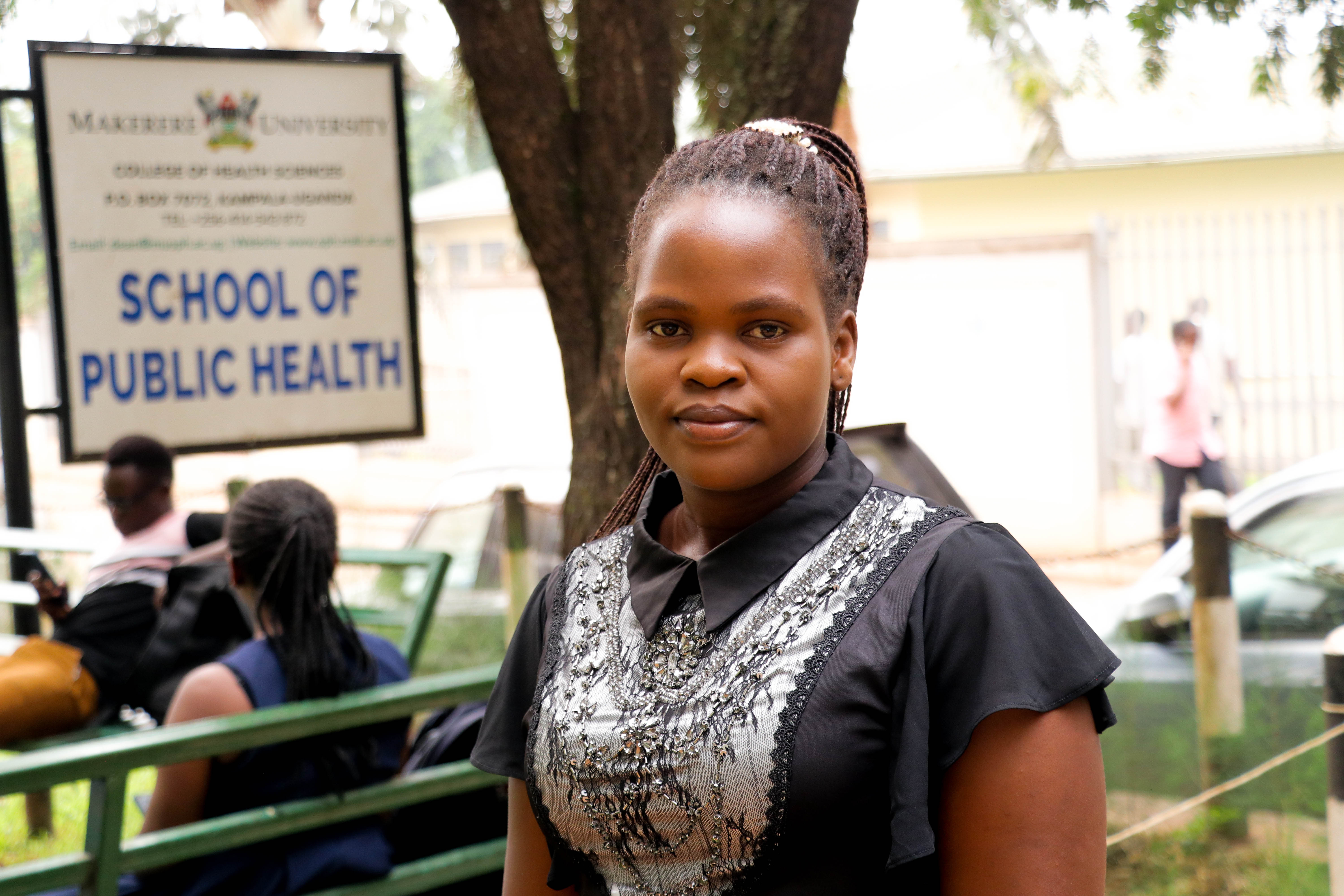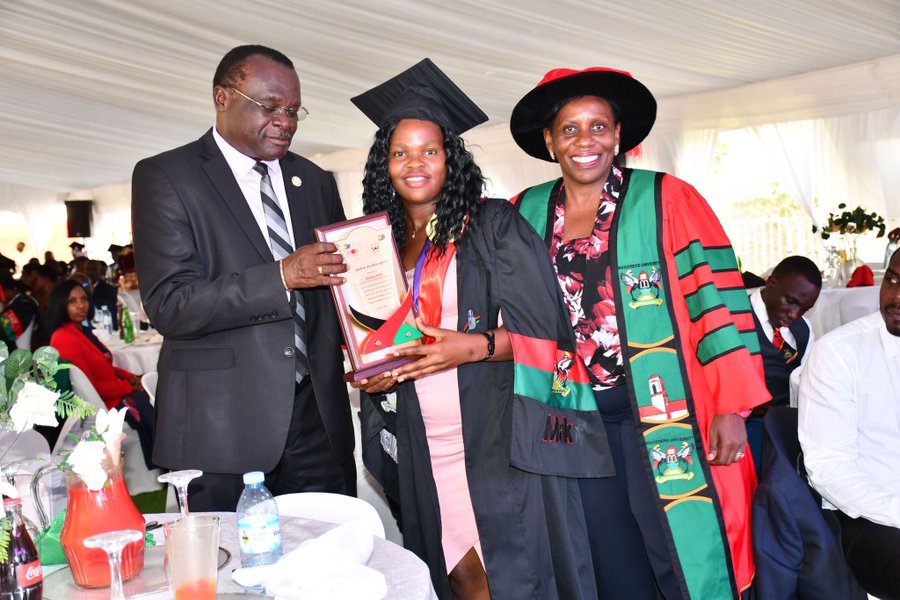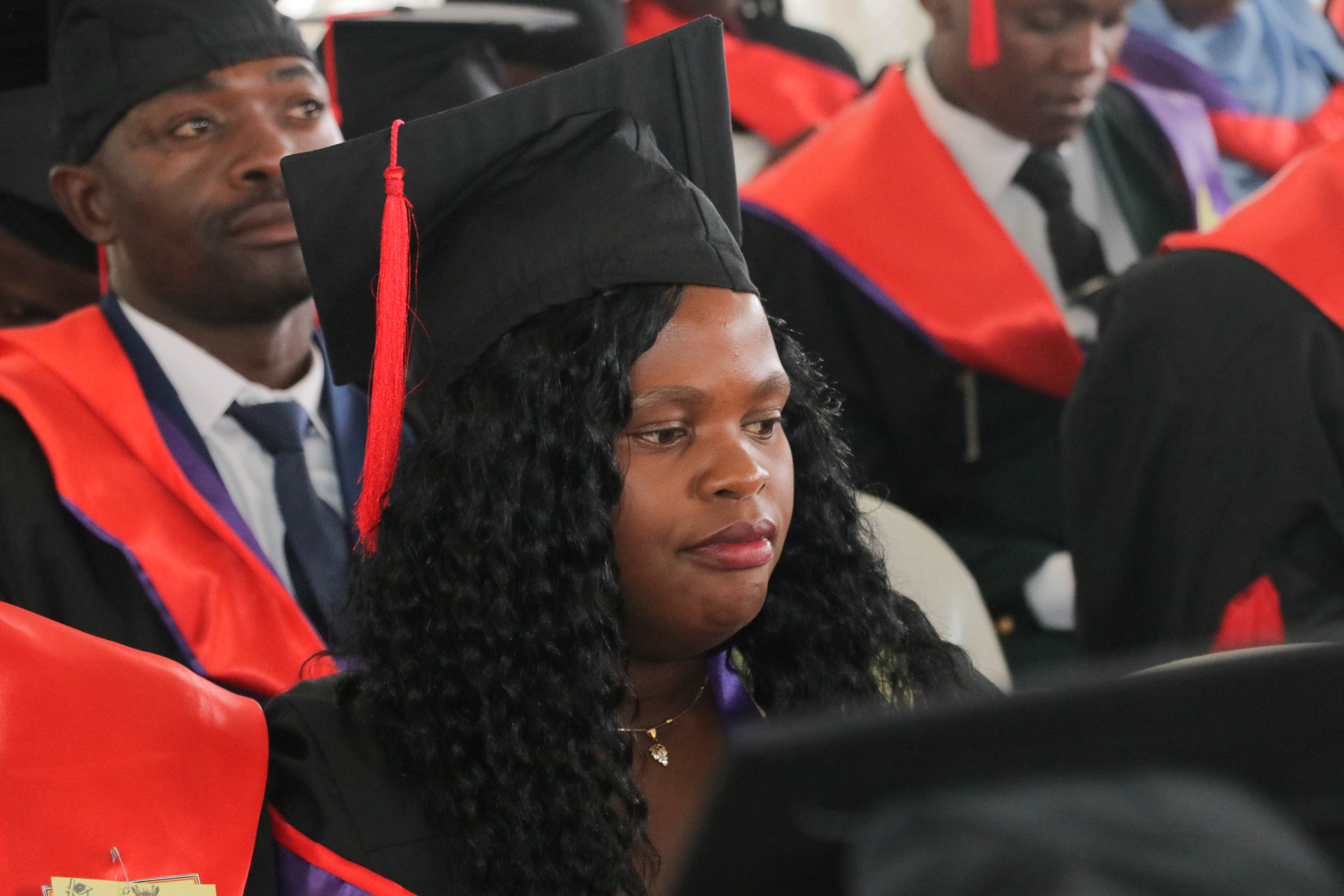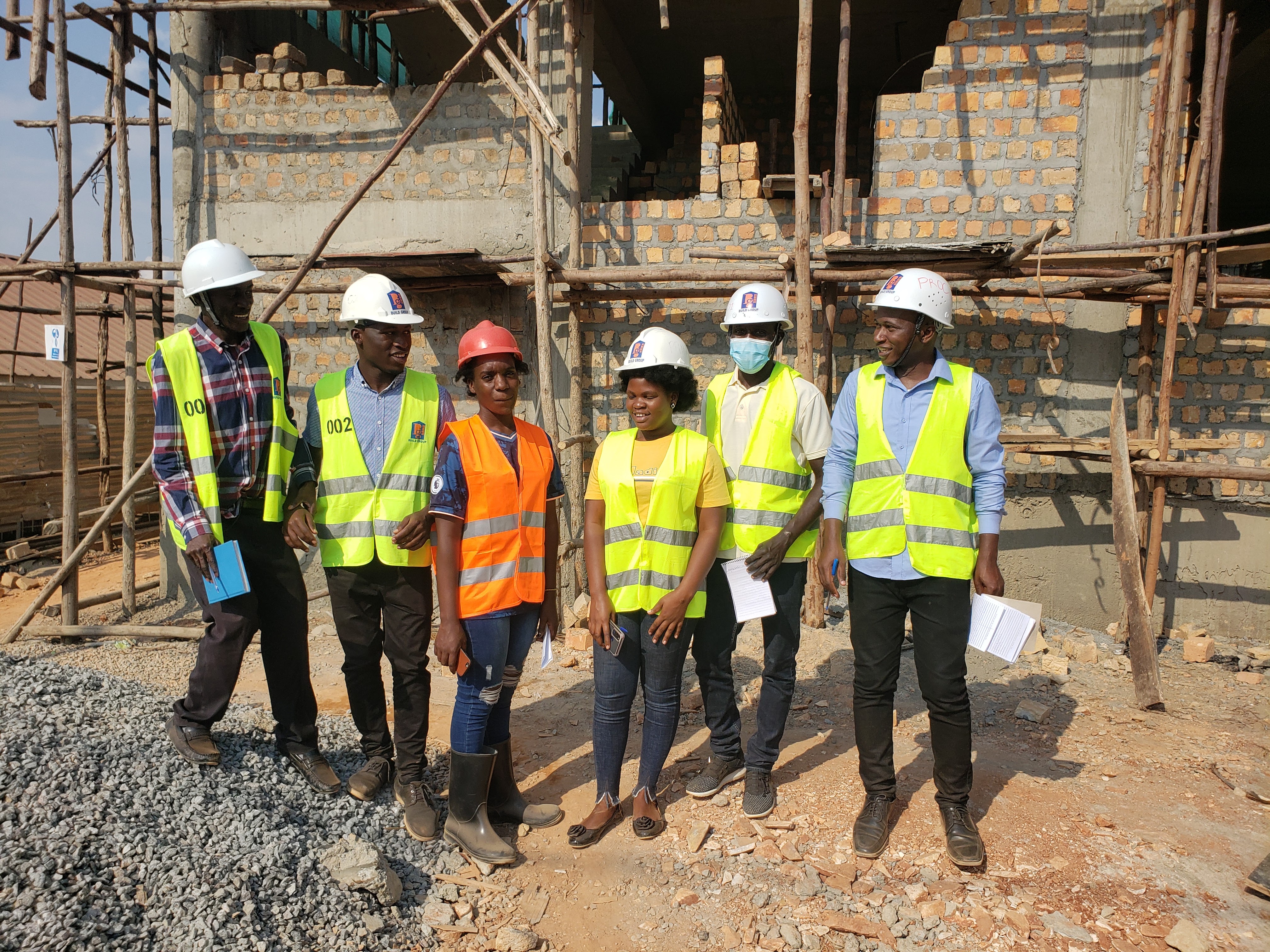
Abonga Dilish is one of the 6,816 females of the 12,913 graduating #Mak74thGrad during the week-long ceremony starting January 29, 2024. She graduates with First-Class Honors in a Degree of Bachelor of Environmental Health Science hosted at Makerere University School of Public Health (MakSPH).
Born on November 5, 1999 to Betty Among and Obua Sam Peter, at Agwok B, Awio parish, Iceme Sub county , Oyam district Lango sub-region, Dilish’s outstanding Cumulative Grade Point Average (CGPA) of 4.44 out of 5.00 places her on the Vice Chancellor’s List, an honor reserved for the highest academic achievers.
Abonga is the only girl among her five siblings. Raised by her mother, Betty Among, in a farming family growing mostly food crops such as sim-sim cassava, beans, and g. nuts, she faced financial difficulties throughout her academic journey. Her parents' separation when she was young added to the hurdles she had to overcome.
“I was born in a family of six, as the only girl. Two are from a different father but the same mother, but four of us are from the same mother and same father, and among those six, I am the only one who reached university. I grew up with my mom right from my childhood because my parents separated when I was still young,” says Abonga.
Abonga's academic journey started at Awio Primary School in Awio parish, Iceme sub county, Oyam North county, Oyam district, where she consistently topped the class. Despite financial challenges, her primary school head teacher assisted by covering PTA and exam fees. This success continued through secondary school at Light Vocation, where academic achievements earned her a bursary, enabling her to complete her studies. “My mother was constantly sick when I was growing up, she was operated several times and most times she could not even afford the small PTA contribution made to school. So, my primary school head teacher used to pay for me the small money for PTA and also the exams.”
Given her parents' financial status, Abonga did not have an opportunity to attend nursery school; rather, she enrolled in Awio Primary School's Primary One in 2007 and completed it here in 2013. She had earned eight aggregates, making her the best student in the school when the PLE results were released.

Abonga was chosen from her village because of her exceptional achievement on the Primary Leaving Examination (PLE). Strong academic performers who lacked the resources to continue further were sought after by her secondary school. “In my secondary level I studied in that school for six years because they were giving me a school bursary and that bursary was based on academic performance every term. So, when they came to our village, they also took me on. When I was just joining Senior One, all they wanted was for us to pay for my uniform and also the medical fee. But on a termly based performance, I was the best in class every term they kept on giving me a school bursary and also scholastic materials every term.”
She would later join Light Vocational Secondary School Lira where she studied her both O and A Levels. In 2017, she obtained 16 aggregates in O' Level. Despite facing challenges and uncertainties in her school times, she obtained 12 points from Biology (‘E’), Chemistry (‘B’) and Mathematics (‘D’) BCM in her UACE.
“I think I just had a biased mind that Biology was hard, though I used to read and try to balance with other subjects, but what made me not perform well in it was just one paper, because it constituted 3 papers, in one paper I did perform very well,” she said.
Adding that; “When I saw 12 points, I was not so much impressed with it because now I was expecting something above that so that I could go for my dream course, Medicine. I thought my dream had been shattered because I failed to raise good points. But again, someone was telling me to go back and re-sit the paper, I wanted to go but again my mind was telling me that I could do another course that was even better than medicine.”

She received a second scholarship for an additional two years of education after acing her senior four exams. But, as a girl in school, the support didn't cover all her needs, creating challenges since her mom couldn't provide everything on time. It's a familiar story—having potential but not getting all, you need due to limited support.
“When I sat my senior six, I didn't have any hope of going anywhere because now like when the results came back, I did not even qualify for government. I also sat from a different district and I could not get district quarter. So, I had to apply for a MasterCard scholarship, but of course, before applying for that scholarship, I first applied to be admitted to Makerere University on private. After getting admission, I applied, I was waiting just without any hope because I did not see anything coming like a scholarship,” she says.
Still making a choice of which course to take at University, Denis Emor, a Health Inspector in Iceme subcounty, Oyam district rooted her to do Environmental Health at Makerere, citing it was good.
“He told me there are several things under Environmental Health you can go into research, not necessarily focusing on government jobs. You can also go into academia; you can do very many things. When you go to master, there are very many fields that you can master in and that's how I decided to come for the course,” she says.
Growing up, Makerere University was the talk of the village, and everyone aspired for their children to attend. Despite not initially considering it, her motivation to excel in high school led her to Makerere University.

MasterCard Scholarship and First time in Kampala
The MasterCard scholarship, a lifeline that would open doors to higher education to Abonga, awarded based on academic performance, provided her with not only financial support for tuition and accommodation but also a monthly stipend and a laptop.
The scholarship not only fulfilled her dream of attending Makerere but also became a blessing for her family, allowing them to secure land and relocate.
Her first day in Kampala, Abonga got lost on her way to Makerere, starting from Namayuba Bus Park. Unfamiliar with the location, she told the cyclist she was going to Senate building, Makerere University.
“I didn't even know where Makerere University was, but Master Card foundation team had told us to come up to the Senate building. When I got a boda rider from town, he told me the place was very far and I should pay him Shs.15,000 and I told him, I only had 10,000 and he agreed to take it to Makerere. From Namayuba, the guy rotated around up to Nakulabye then came back again to the Main Gate of Makerere. After reaching the main campus, I didn't even know where the senate building was. We moved around, going to the College of Education, then moving up to our Western Gate, and then coming back again to the Senate we kept on asking people where our senate was,” she recollects.
During the crowded interview, with over 200 applicants vying for 54 spots, Abonga faced a daunting panel of around 10 people, sitting at a distance due to COVID. Speaking loudly and boldly, it was a tough experience. Despite the uncertainties, she returned home with little hope but prayed fervently for the scholarship. "My daily prayer was a plea to continue my studies, and I even fasted for seven days, eating only in the evening, expressing my strong desire to pursue education. Fortunately, my dedication paid off as I eventually secured the scholarship."
Two weeks post-UNEB, Mastercard team at Makerere University informed her about background checks on her family.
"The day they came, they called me when they were in the nearby trading centre and they wanted me to pick them up. They wanted to know our home to verify the information i had provided and whether my parents were not in a position to support me the way I said to them. I was also not home that day. We were in the garden with my mum but my younger brother was home. I asked for sometime to come, since our garden was at a distance. They told me to stay and they would interact and verify everything with my little brother. They interacted with my brother and they went back without me seeing them," she recalls.
A month post her MasterCard scholarship application, a call came, through her line that she had placed in her mother's phone.
“It was on the 13th of December in 2020 because we joined in 2021. 2021. It was around 3 p.m. We were in the garden with my mum, we were harvesting sim-sim. After hearing the good news, we all left the garden and we went back home when we were all happy,” recalls Abonga.
Life at Makerere University
At Makerere University School of Public Health (MakSPH), Abonga thrived academically. Her dedication and resilience earned her a spot on the Vice Chancellor's List. Despite the transition from village life to the bustling city of Kampala, Abonga found a welcoming and supportive environment at MakSPH.
Initially attached to Mary Stuart Hall, popularly known as Box, Abonga was never a resident even when she wanted to. She would only find a second home in Garden Courts hostel in Kikoni, a neighborhood West of Makerere University.
Life posed challenges amid the excitement. Surrounded by peers from affluent backgrounds and prestigious schools, coming from a humble village, the contrast was startling. "Sometimes you are surprised to see how things are going"
Engaging actively in extracurriculars, Abonga embraced leadership roles and fellowship groups, showcasing her dedication to personal development and community involvement.
From P1 to P4, she naturally assumed the role of class head, and in P5, without applying, she was chosen by the headmaster and teachers to be the head girl until P7. Her consistent selection for leadership positions reflected the trust and encouragement of her peers. This experience helped Abonga overcome initial fears, revealing the potential and confidence others saw in her.
Taking charge in various roles, she addressed assemblies and led discussions on topics like menstrual health, gaining confidence and mastering effective communication across diverse backgrounds.
As she graduates, her research delved into menstrual hygiene management and related factors among primary school girls in Iceme Sub-County, Oyam District. Where, a majority 61.2% of the 361 primary school girls who participated in her study, had poor knowledge of menstrual hygiene management practices, while only 38.8% had good knowledge. In her analysis, girls with literate mothers (with primary, secondary, or tertiary education) were twice as likely to practice safe menstrual hygiene compared to girls with illiterate mothers.
Looking ahead, Abonga envisions pursuing a master's degree in Biostatistics and Epidemiology, inspired by the impactful role epidemiologists play in public health. “After this first degree, I want to do my master's degree in Biostatistics and Epidemiology. Because I am interested in research and I have been seeing my lecturers, one of my lecturers, Dr. Edith Nakku, also did epidemiology I see epidemiologists as being the most important people when it comes to disease outbreaks, like COVID-19, they were the key people doing research here and there.”
As she reflects on her journey, Abonga acknowledges the support of her lecturers, classmates, and the MasterCard scholarship.
Her story serves as an inspiration to others facing challenges, emphasizing the importance of determination, focus, and perseverance in achieving academic success.
Abonga Dilish's excellent performance is not just a personal triumph but a testament to the transformative power of education, resilience, and the support of institutions like Makerere University. She commends MakSPH for providing a friendly and homely environment to support students without any form of segregation.
“I also participated in leadership, from MasterCard where I was a peer mentor. Then from medical school here we have a group of Northerners called LAMSA, Lango Medical Students Association. Those are the things that we are keeping busy.”

MasterCard remains her hope to attain her Master's dream, though the future remains uncertain. The prospect of continuing with them is reserved for those achieving second-class upper or first-class honors. "My gratitude and sincere appreciation go to MasterCard for funding my education for three years. I am sincerely grateful because they were giving back to me and I will also give back to the community."
According to Abonga, MakSPH has has the potential to assist high-achieving students in securing scholarships through our lecturers' connections and the support of our dean.
“I am inspired by Prof. Rhoda Wanyenze, our Dean of the School of Public Health, I find her to be a hardworking, kind-hearted, and motivating figure. Interacting with her in her office and observing her in various contexts, such as conferences, has been enlightening. Madam Nakku too, whom I consider my role model and personal mentor, has provided useful pieces of advice regarding both academic and personal matters,” she says.
Written by Davidson Ndyabahika

